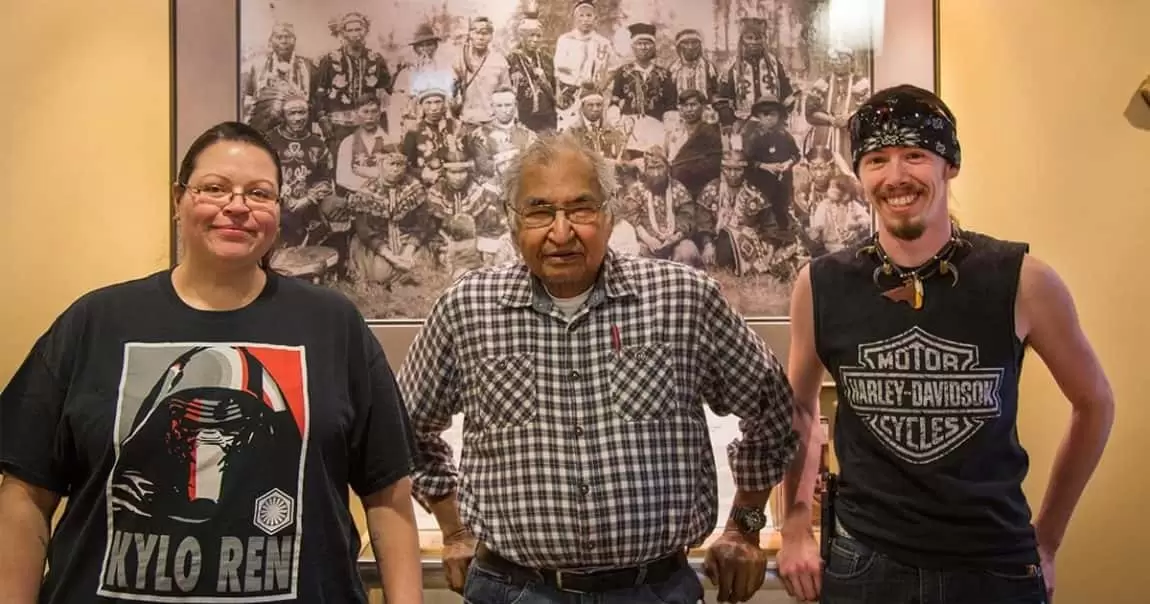Pokagon Apprentices Invest Four Years into Learning the Potawatomi Language

.entry-date::after {content: ” by Val Niehaus”;}
February 1, 2017 – Full Issue
In 2013, Forest County Potawatomi (FCP) and Pokagon Band of Potawatomi collaborated on an apprenticeship called Potawatomi Master Apprentice Language Program. The idea behind this program was to choose two apprentices from the Pokagon community to come and reside in Crandon, Wis., to learn the Potawatomi language from fluent speakers in the FCP community. The thought was that after spending some time learning the language, they could then return to the Pokagon community with this new knowledge. This idea came from Jim Thunder Sr., who voiced his thoughts to the Pokagon tribal council, and after discussing the idea, they funded the project.
Carla Collins and Kyle Malott, both from Dowagiac, Mich., and both Pokagon, were the individuals chosen to take on this venture. To be accepted into the program they had to have their applications reviewed and then pass a written exam. Collins and Malott received the highest scores on this exam.
The original plan was to have Collins and Malott here for two years, but if anyone knows the difficulty involved in learning a second language, it’s easy to realize that it can take much longer. With two different extensions from the Pokagon Band, both apprentices were able to stay here until their term is up this year.
Along with other students who are interested in learning their language so as to preserve it for future generations, the apprentices attend classes a couple of times a week with Thunder. Collins says, “Within our community we don’t have any fluent speakers left. So, to learn the language, we had to come to where the fluent speakers are. Jim took us under his wing and has been going above and beyond in helping us. For the first two years, we predominantly worked with Mary Jane (Thunder). Now, for the last two, it is with Jim.”
PTT asked both apprentices when their apprenticeship was ending. Malott said, “I am done in March. I then plan to go back home where I am contracted to teach for five years.” Collins mentioned, “The whole goal of this was to learn as much as possible from Jim. We then will go back to our community and teach our own apprentices as much as we can. Then everything will trickle down from there.” Collins said she is done at the end of June.
Collins and Malott have adjusted well these past few years. Collins says, “The whole community has been really good to us and has made us feel comfortable. Mike Alloway has helped us feel very comfortable here at the museum and along with Jim, they both made us feel very welcomed.” Thunder says, “These two are doing very well and I am very confident in what they have learned and in their ability to teach others.”
Collins’ and Malott’s days are pretty busy. They study intensively and listen to tape recorded lessons from class to hear the language. Attending class is of key importance also. Collins says, “Kyle and I practice quite a bit with each other. We also have a beginner class we attend and then later an afternoon class. I also speak the language at home with my kids.” Malott says the biggest struggle is just getting everything memorized correctly and being able to say it back the correct way. Thunder says, “You can’t just learn the language by going to class. You have to put a lot of your own time into it.”
In addition to the classes, both apprentices also accompany Jim if he needs to travel to other bands to help them with the language. They have traveled to Hannahville and to the Prairie Band Potawatomi. Helping and learning from Thunder during these times is very instrumental to their own education.
Preserving the Potawatomi language is extremely important for all tribal members. As has been said, “If you lose your language, you lose your existence.” This is a very serious threat to the Potawatomi people and with this program in place, it is hoped that the odds of this happening are lowered. With the dedication and persistence of both Collins and Malott, let’s hope this fear becomes just a distant memory of what could have happened had these two individuals not found the means to learn this almost extinct language.
It is also of great importance to the tribe to see the people attending classes at the FCP Cultural Center, Library & Museum. Hopefully, more individuals will consider putting in the time to learn their language.
As for the apprentices, we wish them both the best of luck in the future as they pursue their plans to teach others and to make certain that this language is preserved for future generations.
